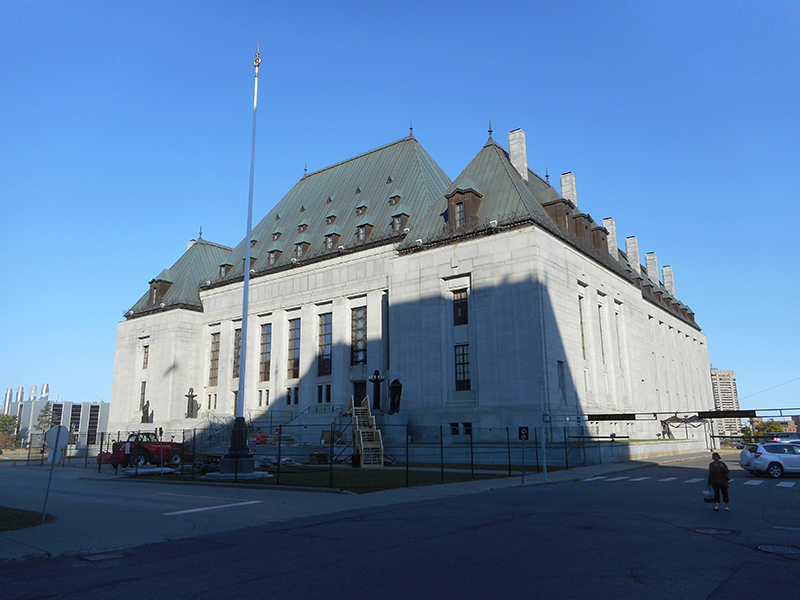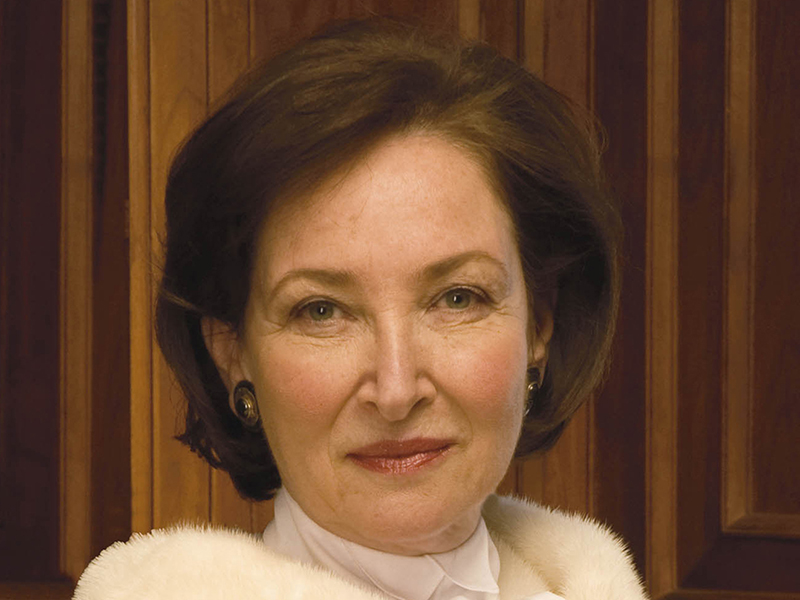In honour of Canada’s 150th birthday, The CJN presents 40 profiles of some of the most prominent Jewish Canadians throughout our history.
From the heights of the Canadian legal profession, the Honourable Rosalie Silberman Abella is now spreading her wings and taking her message internationally. After a lifetime of firsts – Canada’s first pregnant judge in 1976; first Jewish female Supreme Court Justice in 2004 – last year, Abella became the first Canadian woman to receive an honorary degree from Yale. And just this May, she delivered the commencement address at Brandeis University.
In her address, however, Abella admitted she was “deeply concerned about the state of justice in the world.”
Born in 1946 in a displaced person’s camp, Abella has fought for human rights throughout her career.
But now, as she told Brandeis grads, “Here we are… watching ‘never again’ turn into ‘again and again,’ and watching that wonderful democratic consensus fragment, shattered by narcissistic populism, an unhealthy tolerance for intolerance, a cavalier indifference to equality, a deliberate amnesia about the instruments and values of democracy, and a shocking disrespect for the borders between power and its independent adjudicators like the press and the courts.”
In many ways, Abella was born to the law. Her father, Jacob Silberman, received a master’s degree in law from Cracow’s renowned Jagiellonian University, and after the war, was appointed by U.S. forces to oversee legal services for displaced persons in Germany.
READ: THE CJN’S SPECIAL COVERAGE OF CANADA’S SESQUICENTENNIAL
In her Brandeis talk, Abella called her own birth an act of “breathtaking optimism,” after her parents lost a two-year-old son during the war.
After the family came to Canada, however, Silberman was barred from the law despite glowing credentials because he was not a citizen. The moment young Rosalie heard that, at age four, she made up her mind.
In a 2014 conversation on C-SPAN alongside Ruth Bader Ginsburg, associate justice of the U.S. Supreme Court, and Dorit Beinisch, former president of Israel’s Supreme Court, Abella said, “When people said, ‘What are you going to be when you grow up?’, I said, ‘A lawyer.’ I knew no women who were lawyers. All I knew was he couldn’t be it, and he wanted to be it, and I would be it.”
At first, she had no idea of the struggle that would entail. “As an immigrant, you have zero expectation of entitlement… It is all about working really hard to pay back the country for letting you be a member, working really hard in school, so you are the top student in school.”
Jacob Silberman died in 1970, one month before Abella graduated from law school.

Later, when she became pregnant with her first son, Jacob, born in 1973, she knew no other mothers who were lawyers. But she persevered, and in 1976, only 29 and pregnant with her second son, Zachary, she was appointed to Ontario’s Family Court, becoming the first pregnant judge in Canadian history. Both sons have become lawyers.
Besides the family connection to the law, Abella also brings the exquisite sensitivity of an outsider’s point of view. “I was female, Jewish, and an immigrant, in a male profession… It can be a great advantage to understand that you’re different, you’re never going to be like everybody else, and that’s good. Enjoy the fact that you’re different.”
Throughout her career, Abella has championed women’s and minority rights. In 1984, she served as the sole commissioner of the federal Royal Commission on Equality in Employment, defining “employment equity” and other terms which have set a precedent now adopted by other countries as well.
Abella has written over 90 articles and written or co-edited four books, and is the second longest-serving judge on the Supreme Court bench, after Chief Justice Beverley McLachlin.
Her husband Irving, a professor at York University and former president of the Canadian Jewish Congress, is well known for chronicling the history of Canada’s Jews.
‘It is time to remind ourselves why we developed such a passionate and, we thought, unshakeable commitment to democracy and human rights’
Abella’s appointment to the Supreme Court in 2004 by Prime Minister Paul Martin was met with alarm by conservatives. At the time, Andrew Coyne of the National Post wrote that, “The appointment of a Supreme Court judge should not be an occasion to score political points or to ram a controversial choice down the opposition’s throats.”
In 1998, with the Ontario Court of Appeal, Abella determined that “spouse” in the Income Tax Act includes same-sex partners, leading to changes in dozens of federal statutes while opponents accused her of using the judiciary to create law.
There has been some speculation about whether Abella is headed for the chief justice seat after McLachlin retires in December.
Traditionally, the longest-serving member usually becomes chief justice, but an opposing tradition indicates that appointments alternate between Quebec and non-Quebec justices. To date, Prime Minister Justin Trudeau has been silent on the question.
Looking back, Abella said on C-SPAN, she entered the law at an ideal time. “To be a lawyer in an era when it was all about legal change, social change, justice change, when you had all these groups screaming for entry into the mainstream… that was a privileged time to be a lawyer.
“Out of the banality of the ’50s,” she said, “you had the ’60s, which was an awakening of social institutions and arrangements… the women’s movement, race. And then the ’70s came along, and we added aboriginal issues, indigenous issues, then sexual orientation. We were a generation in which change was all around us.”
Today, despite her concern for justice worldwide, Abella believes change is still possible through heeding the lessons of the Second World War.
As she told Brandeis grads, drawing on both personal and legal experience, “It is time to remind ourselves why we developed such a passionate and, we thought, unshakeable commitment to democracy and human rights, to remember the three lessons we were supposed to have learned from the concentration camps of Europe: indifference is injustice’s incubator; it’s not just what you stand for, it’s what you stand up for; and we can never forget how the world looks to those who are vulnerable.”




